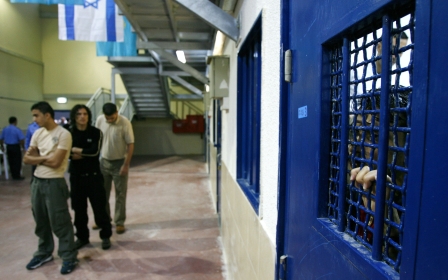Coronavirus: As court strikes down new rule, Israel's pregnant workers remain in limbo

On Monday, Israel’s Supreme Court struck down a government cabinet order that had allowed businesses to unilaterally put pregnant women on unpaid leave during the Covid-19 pandemic, following two petitions from legal rights organisations contesting the move.
Under normal circumstances, businesses need to ask permission from the Israeli government to place women who are pregnant or receiving fertility treatments on unpaid leave, in order to ensure that the termination is not due to pregnancy discrimination.
New MEE newsletter: Jerusalem Dispatch
Sign up to get the latest insights and analysis on Israel-Palestine, alongside Turkey Unpacked and other MEE newsletters
The rule also applies to women who are applying for surrogacy adoption or who are living in shelters for survivors of domestic violence.
But on 10 April, the cabinet of Prime Minister Benjamin Netanyahu passed the regulation change doing away with the need for government approval, without consulting lawmakers in Israel’s parliament, the Knesset.
While the amendment has now been overturned, uncertainty remains for thousands of expecting parents and domestic violence survivors who lost their jobs in the process.
A ‘scandal’
Knesset member Aida Touma-Sliman said the Israeli minister of welfare told the parliamentary labour committee, which she chairs, that there had been a massive increase in the number of requests to place pregnant women on unpaid leave amid the pandemic - with 4,000 requests from business owners in the span of two weeks before the rule change took place.
On 17 April, three days before the scheduled court hearing, Netanyahu’s office rescinded the regulations.
But during the week the rule was in effect, lawyers said thousands of pregnant women were placed on unpaid leave - although without any governmental oversight, the precise number of people affected by the measure remains impossible to quantify.
The initial justification provided by government officials was that the rule change would allow this protected class of workers to apply for unemployment benefits if businesses were unable to pay their employees due to the economic impact of the pandemic and ensuing confinement orders.
In court on Monday, judges ruled in favour of the human rights organisations that filed the petition, arguing that the government had acted outside its role and effectively allowed businesses to discriminate against pregnant individuals and domestic abuse survivors.
In addition to revoking the ten-day-old rule, the Supreme Court ordered government officials to meet with Knesset members to discuss how the government can relieve businesses while protecting pregnant individuals’ rights.
For Touma-Sliman, the change violated a 1954 law and due process.
“If you need to change any law, you should bring it up for the official process of changing a law, which is legislation in the Knesset,” Touma-Sliman told Middle East Eye. “It’s really a scandal how they dealt with things.”
Tipped off early of the planned rule change, Touma-Sliman said she sent a letter to Netanyahu denouncing the change as harmful to vulnerable women. When that letter went unanswered last week, she then contacted Adalah, a Haifa-based legal nonprofit focused on minority rights, in order to file a petition to the Supreme Court.
“Emergency regulations should not suspend the rule of law… and the right to equality,” Sawsan Zaher, a lawyer with Adalah, told MEE, emphasising that the women affected by the cabinet decision were “among the most marginalised”.
At the same time, a group of Israeli human rights organisations, including labour rights group Kav LaOved, drafted a similar petition to the Supreme Court.
Uncertain fate for laid-off workers
Aelad Cahana, a lawyer with Kav LaOved, said he believed the government didn’t consider the implications of the change before implementing it.
“They made a mechanism that had no supervision at all,” Cahana told MEE. “It’s very clear that - I don’t know if they thought more about the employer, but they didn’t listen much to the workers.”
On Monday, the discussion at the Supreme Court turned to what should happen to the women who had been laid off during the period in which the now-cancelled rule was in effect.
Women who had been placed on unpaid leave would have been eligible for unemployment through Israel’s national insurance agency, allowing them to receive checks for a portion of their salary.
'The important thing that this decision shows very clearly is that the government is not above the Knesset, it is not allowed to do whatever it wants'
- Aida Touma-Sliman, Knesset member
Judges suggested that women who’d received insurance money would have to return it to the state if the emergency ruling was overturned, Zaher said.
But the reversal of the cabinet order still spells trouble for those whose employers have been economically affected by the pandemic.
If women have to give back the benefits they received, but their employers don’t have the means to pay salaries, lawyers say the situation might become even worse for this vulnerable group - as they called for the Israeli government to find a solution.
“As a lawyer, I didn’t have a solution because this was something the government was supposed to think about,” Zaher said. “It’s playing with the destiny of women and then making us petitioners provide a solution. That’s not in our field of expertise.”
Supreme Court judges finally ruled that government officials would need to come up with a solution and meet with lawmakers to implement the plan.
“The important thing that this decision shows very clearly is that the government is not above the Knesset. It is not allowed to do whatever it wants,” Touma-Sliman said. “The state of emergency should not be used to override laws that we struggled for years to put in place."
Middle East Eye delivers independent and unrivalled coverage and analysis of the Middle East, North Africa and beyond. To learn more about republishing this content and the associated fees, please fill out this form. More about MEE can be found here.





